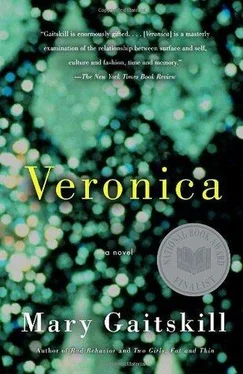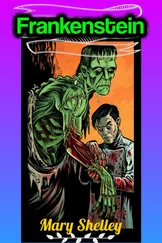Mary Gaitskill - Veronica
Здесь есть возможность читать онлайн «Mary Gaitskill - Veronica» весь текст электронной книги совершенно бесплатно (целиком полную версию без сокращений). В некоторых случаях можно слушать аудио, скачать через торрент в формате fb2 и присутствует краткое содержание. Год выпуска: 2006, Издательство: Vintage, Жанр: Современная проза, на английском языке. Описание произведения, (предисловие) а так же отзывы посетителей доступны на портале библиотеки ЛибКат.
- Название:Veronica
- Автор:
- Издательство:Vintage
- Жанр:
- Год:2006
- ISBN:нет данных
- Рейтинг книги:5 / 5. Голосов: 1
-
Избранное:Добавить в избранное
- Отзывы:
-
Ваша оценка:
- 100
- 1
- 2
- 3
- 4
- 5
Veronica: краткое содержание, описание и аннотация
Предлагаем к чтению аннотацию, описание, краткое содержание или предисловие (зависит от того, что написал сам автор книги «Veronica»). Если вы не нашли необходимую информацию о книге — напишите в комментариях, мы постараемся отыскать её.
Veronica — читать онлайн бесплатно полную книгу (весь текст) целиком
Ниже представлен текст книги, разбитый по страницам. Система сохранения места последней прочитанной страницы, позволяет с удобством читать онлайн бесплатно книгу «Veronica», без необходимости каждый раз заново искать на чём Вы остановились. Поставьте закладку, и сможете в любой момент перейти на страницу, на которой закончили чтение.
Интервал:
Закладка:
No matter how unfashionable the party, fashionable music was always playing. The fashion then was silly and sepulchral at once, with hopping, skipping beats playing off a funereal overlay. Somebody sang, “This kiss will never fade away,” his voice like an oily black machine operating a merry-go-round of music flying on grossly painted wings. “It’s about the bombing of Dresden,” said a drunk boy. “Excuse me,” I said, and walked away. Heat flared in the flying music, then died like an explosion seen from far away. People walked around smiling and talking while the music likened mass death to a kiss and gave silliness a proud twist to its head. This kiss will never fade away . Alain kissed me forever while I stood on the outskirts of parties, watching people who meant something to one another. A fat person with an outthrust jawbone took someone’s hand and squeezed it; there was a burst of goodwill. A woman with desperately bony calves, made stark by her big high heels, grinned at someone across the room, her grin a signal of deep things inside both of them that nobody else could see. Sometimes I saw the goodwill and the deep things and longed to know them. Sometimes I saw the thrusting jaw and the bony calves and turned up my nose. Because I could never fully have either feeling, I stayed detached. It was as if I were seventeen again and longing to live inside a world described by music — a world that was sad at being turned into a machine, but ecstatic, too, singing on the surface of its human heart as the machine spread through its tissues and silenced the flow of its blood. In this world, there were no deep things, no vulgar goodwill, only rigorous form and beauty, and even songs about mass death could be sung on the light and playful surface of the heart.
I didn’t say any of this. I didn’t even think it. But it was visible in the way I held my body, and in my bitter, despising eyes. Other people could see it in me as surely as I saw it in them. And so I was able to make friends. I went to nightclubs with an “actress” named Joy, who might’ve been a model if not for hips that would’ve been ungainly in a photograph, but which gave her living walk a pleasing, viscous reek. She worked as a hostess in a piano bar, where she got paid to drink and talk to lonely businessmen. She lived in a tiny shotgun apartment piled with dirty dishes, cat boxes, and open jars of clawed-at cold cream. Hurled pairs of pants tried to flee across the couch; wilted dresses snored on the kitchen chairs. The two cats tore the stuffing out of the couch and rolled toilet paper down the hall. During the day, Joy sat in this ragged nest like a princess, bathing in the kitchen with one gleaming pink foot perched on the edge of the tub, or sitting wrapped in a soiled comforter to drink coffee and eat cheesecake out of a tin. At night, she sailed out wearing absurd clothes as if they were Givenchy gowns. Once when I complimented her on one of her mismatched earrings, she pointed at the sky and said, “That earring means, Don’t look at my finger; look at the moon.”
Together, we were assured admittance to exclusive clubs where, lifted up and out of the hoi polloi and deposited at the entrance by the doorman’s fastidious gaze, we handed our coats to a gaunt creature in a coat-lined cave, then walked down the glowing sound-chamber hall, where music, lightly skipping in the main rooms, here bumbled from wall to wall like a ghost groaning in purgatory. We turned a corner and the music showed its laughing public face. We entered the great night flower of fun, open and dark like a giant lily swarming with drunken fairies. Into the swarm we flew, Joy darting, hovering, seeking and finding the inevitable man handing out cocaine to girls.
Our conversation was so much torn paper on the surging current of our united forward intent. But at some point, she would lean with her hip against me, and her body would talk to me, light and charmingly, of earrings and the moon. And at some other point, I would emerge from the bathroom and she would be gone, leaving me to wander with drunken, burning eyes, seeking a way into heaven. Sometimes I would wake with a dry mouth in the dim apartment of a naked man who’d promised he was that way but whose snoring face now denied it.
If I called Joy, she would tell me of her own adventures, of this one’s amazing kiss, or that one’s art-world status. Otherwise, I didn’t hear from her until she wanted to go out again; if I wasn’t able to go out that night, she quickly got off the phone.
Then there was Cecilia, with whom I went to movies and coffee and sometimes dinner. She had meager beauty and magnificent style. Her face was made of such dramatic planes that I remember her with her big bossy nose on sideways, one intense little eye to the side of it and the other peering over its humped middle. She wore jewelry and hats and she sat in a sideways twist. She wrote plays. She had a rich family, who paid for her huge place; when she was depressed and feeling “trapped,” she would check into a suite at the Plaza for the weekend and return feeling refreshed. Most of our conversations were ironic and lively on the first layer, blunt and fixed on the second and only layer down. But she once called me late at night, crying because she felt ashamed of her wealth and her privileged family. “We thought we were so great because magazines came and photographed our fucking unlivable living room. But we were shit! Alison, we were shit! I don’t want to be shit! I want to be a real person!” I didn’t know what to say; dimly I understood, and was moved. But when I called her the next day, she just talked about a party she was giving, one to which she had not invited me. “I need people who can talk about the arts and current events,” she said. “It’s that kind of party.”
“That is so rude,” said Candy.
But to me, it wasn’t. I understood that Cecilia looked at me as an object with specific functions, because that’s how I looked at her. Without knowing it, that is how I looked at everyone who came into my life then. This wasn’t because I had no feelings. I wanted to know people. I wanted to love. But I didn’t realize how badly I had been hurt. I didn’t realize that my habit of distance had become so unconscious and deep that I didn’t know how to be with another person. I could only fix that person in my imagination and turn him this way and that, trying to feel him, until my mind was tired and raw.
Heart pounding dully, I climb the outer ridge of a small but steep hill. I can smell my fever coming off me like mist. Tired and raw. My whole being is tired and raw. At the top of the hill are rotting trees, dying as they stand. I shouldn’t be walking up this hill. I should be home in bed. With each step, I sway in my basket of tendons and bones, my mind too weak to turn anything any way. My mind can’t protect me from feeling, and I’m glad for that. Sight and sound flow into it; feeling bleeds out of it. I walk up the mountain now because soon I may be too sick to do it. But still, I’m glad.
At the bottom of the ridge, dead oaks have fallen, blanched as old bones, dry even in the rain. Above me, living trees list and groan. I climb over the bones. The gray bark of the freshly dead is loose and cracked open; pale lacy whorls of fern cling to it in clumps, like tangled baby’s hair. Sensitive and perseverant, they cling to and comfort death. Beneath the fern, the bark is mottled with light green mold, feeding lovingly. My thoughts dissolve in the gray and green, traveling from life to death to life.
I did not fix Veronica in my mind, or turn her this way and that, because I didn’t care about her. But I was tolerant enough to take her in at the regular low decibel of work-time conversation. I was not interested in her, but I was curious about her, like I might be curious about an elaborate object. The cuckoo clock sounded the hour; the bird popped out. I listened to her talk about her movies, her six seal-point Siamese cats, and her bisexual boyfriend, Duncan. On either side of the clock face, tiny wooden doors sprang open and figures with blind eyes and puckered lips came whirring out to kiss.
Читать дальшеИнтервал:
Закладка:
Похожие книги на «Veronica»
Представляем Вашему вниманию похожие книги на «Veronica» списком для выбора. Мы отобрали схожую по названию и смыслу литературу в надежде предоставить читателям больше вариантов отыскать новые, интересные, ещё непрочитанные произведения.
Обсуждение, отзывы о книге «Veronica» и просто собственные мнения читателей. Оставьте ваши комментарии, напишите, что Вы думаете о произведении, его смысле или главных героях. Укажите что конкретно понравилось, а что нет, и почему Вы так считаете.












